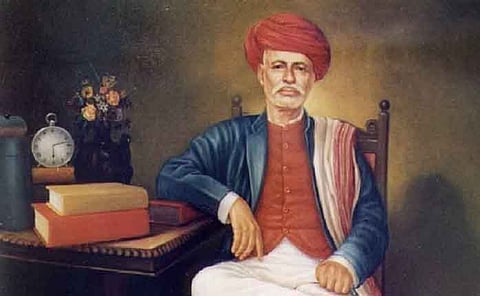
As a grateful nation remembers Jyotiba Phule on his death anniversary. The Mooknayak takes a look at the pioneering work done by the great social reformer of his time.
Jyotiba Phule was born on 11th April 1827 to a couple belonging to Mali caste. He was married early at the age of 13 like most of the children of his time, but unlike most others, he managed to receive an English education at the Scottish Mission High School.
In the mid-19th century, the Peshwas had become a spent force but the brutal Brahminism unleashed by them had managed to persist and was ravaging the society. At such a point Jyotiba Phule dared to rise against the inhuman Brahminical dictates of the time. Some of the brutal heart-wrenching practices harboured and propagated during the Peshwa were
The times were also not good for the women, as they were subjected to various restrictions and were not allowed to go to school.
1848 was a watershed year in the life of Jyotiba Phule. The bitter experience he had at a Brahmin friend's wedding was to change his life forever. The parents of the friend berated him for having attended a Brahmin marriage ceremony, which was not to be attended by a Shudra.
The same year he read Thomas Paine's book Rights of Man, which sensitised him towards man's human rights. Jyoti realised that the best way to empower the Shudras and the women was by educating them. Jyotiba began by teaching his wife Savitri Bai Phule. Finally, they set up India's first indigenous school for girls at Pune, much to the chagrin of the upper castes of the city.
The couple had to steer through formidable headwinds to continue their noble cause. Not only were they ostracised by the conservative society, but their own family members also boycotted them. However, they were also helped by some people like Fatima Sheikh, who lent their premises to them. Unfazed by the obstacles, they remained defiant and opened schools for the Untouchables.
Phule realised that all social ills and conservatism had religious underpinnings and therefore didn't hold back to attack religion and its dogmas. He became a virulent critic of Hinduism and its Brahminical moorings. He considered religious texts to be the root cause of the social evils prevalent in society.
"If there is only one God, who created the whole of mankind, why did he write the Vedas only in the Sanskrit language despite his anxiety for the welfare of the whole of mankind? What about the welfare of those who do not understand this language?"
In 1874, he formed SatyaShodhak Samaj with the aim of focusing on the rights of Dalits and women. He used the mouthpiece of the Samaj called Deenbandhu to propagate his views.
Ghulamgiri, one of his books is considered a masterpiece and is quoted extensively in academic circles. The book exposes Brahminical orthodoxy and attacks the caste system vehemently.
The Phule couple did pioneering work in the field of social upliftment. Dr. B.R. Ambedkar has acknowledged him as one of his three inspirations.
Jyotiba Phule breathed his last on 28th November 1890. Though he died childless he enabled lots of children to live a better life and continues to serve as an inspiration.
You can also join our WhatsApp group to get premium and selected news of The Mooknayak on WhatsApp. Click here to join the WhatsApp group.